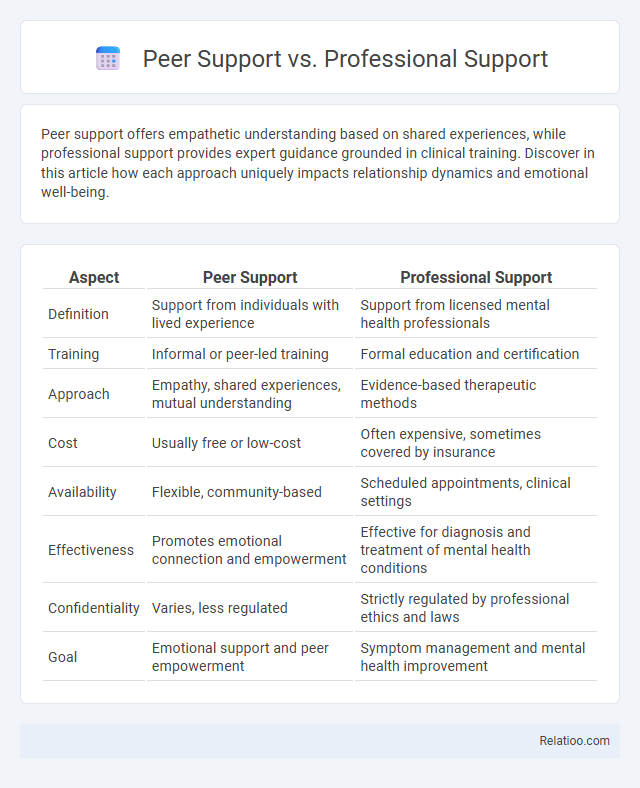Peer support offers empathetic understanding based on shared experiences, while professional support provides expert guidance grounded in clinical training. Discover in this article how each approach uniquely impacts relationship dynamics and emotional well-being.
Table of Comparison
| Aspect | Peer Support | Professional Support |
|---|---|---|
| Definition | Support from individuals with lived experience | Support from licensed mental health professionals |
| Training | Informal or peer-led training | Formal education and certification |
| Approach | Empathy, shared experiences, mutual understanding | Evidence-based therapeutic methods |
| Cost | Usually free or low-cost | Often expensive, sometimes covered by insurance |
| Availability | Flexible, community-based | Scheduled appointments, clinical settings |
| Effectiveness | Promotes emotional connection and empowerment | Effective for diagnosis and treatment of mental health conditions |
| Confidentiality | Varies, less regulated | Strictly regulated by professional ethics and laws |
| Goal | Emotional support and peer empowerment | Symptom management and mental health improvement |
Introduction to Peer Support and Professional Support
Peer support involves individuals with lived experience providing emotional and practical assistance, fostering empathy and mutual understanding in your journey toward wellness. Professional support is delivered by trained specialists such as therapists, counselors, or social workers who offer evidence-based interventions tailored to your specific needs. Both peer and professional support play crucial roles in comprehensive care, complementing each other to create a balanced support system.
Defining Peer Support: Key Features
Peer support involves individuals with shared experiences providing emotional, social, and practical assistance to one another, fostering empathy and mutual understanding. Key features include reciprocal relationships, shared lived experiences, and non-hierarchical communication, distinguishing it from professional support where licensed experts deliver structured interventions. Unlike traditional care, peer support emphasizes empowerment and community-driven help, enhancing resilience and self-management among participants.
Defining Professional Support: Scope and Roles
Professional support encompasses specialized assistance provided by trained and licensed individuals such as therapists, counselors, social workers, and medical professionals, each operating within defined ethical and regulatory frameworks. This scope includes diagnosis, treatment planning, therapy, and crisis intervention, addressing complex mental health, medical, or social issues beyond the typical reach of peer support. The distinct roles in professional support prioritize evidence-based practices and confidentiality standards, ensuring accountable, structured care tailored to individual needs.
Benefits of Peer Support
Peer support offers unique benefits such as shared lived experiences, fostering empathy, trust, and a sense of belonging that professional support may not always provide. It empowers individuals through mutual understanding, reducing stigma and promoting resilience within communities. Peer support complements professional care by enhancing emotional well-being and encouraging sustained engagement in recovery processes.
Advantages of Professional Support
Professional support offers specialized expertise and evidence-based methods tailored to individual needs, ensuring effective and safe interventions. Certified professionals maintain confidentiality and ethical standards, providing structured guidance that peer support might lack. Access to professional support often includes comprehensive assessments and referrals to additional resources, enhancing overall care quality.
Limitations of Peer Support
Peer support offers valuable empathy and shared experiences but lacks the clinical training necessary to diagnose or treat complex mental health conditions. Professional support provides evidence-based interventions delivered by licensed clinicians, yet may lack the relatability found in peer interactions. Care systems integrate both approaches but can face challenges in coordination, making peer support an important complement rather than a standalone solution.
Limitations of Professional Support
Professional support often faces limitations such as dependency on structured hours and formal protocols that may not cater to the immediate, personalized emotional needs of individuals. Unlike peer support, which offers relatability through shared experiences, professional support can sometimes lack the empathetic connection necessary for fostering trust and openness. Access constraints and potential stigmatization further restrict the effectiveness of professional care in addressing ongoing, nuanced mental health challenges.
Comparing Effectiveness: Peer vs Professional Support
Peer support offers relatable experiences and emotional understanding that can enhance connection and trust, which often leads to improved mental health outcomes. Professional support provides expert knowledge and evidence-based interventions tailored to your specific needs, ensuring structured and clinically informed care. While peer support excels in fostering empathy and shared experiences, professional support remains more effective for complex or severe conditions requiring specialized treatment.
When to Choose Peer Support or Professional Help
Peer support is ideal for individuals seeking shared experiences, emotional understanding, and community connection during early stages of stress or mental health challenges. Professional support is necessary when symptoms worsen, require diagnosis, or need structured intervention such as therapy or medication management. Care services, including medical or residential care, are suitable for severe or chronic conditions needing continuous monitoring and specialized treatment.
Integrating Peer and Professional Support for Holistic Care
Integrating peer support with professional support enhances holistic care by combining lived experience with clinical expertise, offering more comprehensive emotional and practical assistance. Your well-being benefits from this dual approach, as peer support fosters empathy and community connection while professional support ensures evidence-based interventions and medical oversight. This collaborative model bridges gaps in mental health services, promoting recovery, resilience, and sustained wellness.

Infographic: Peer Support vs Professional Support
 relatioo.com
relatioo.com